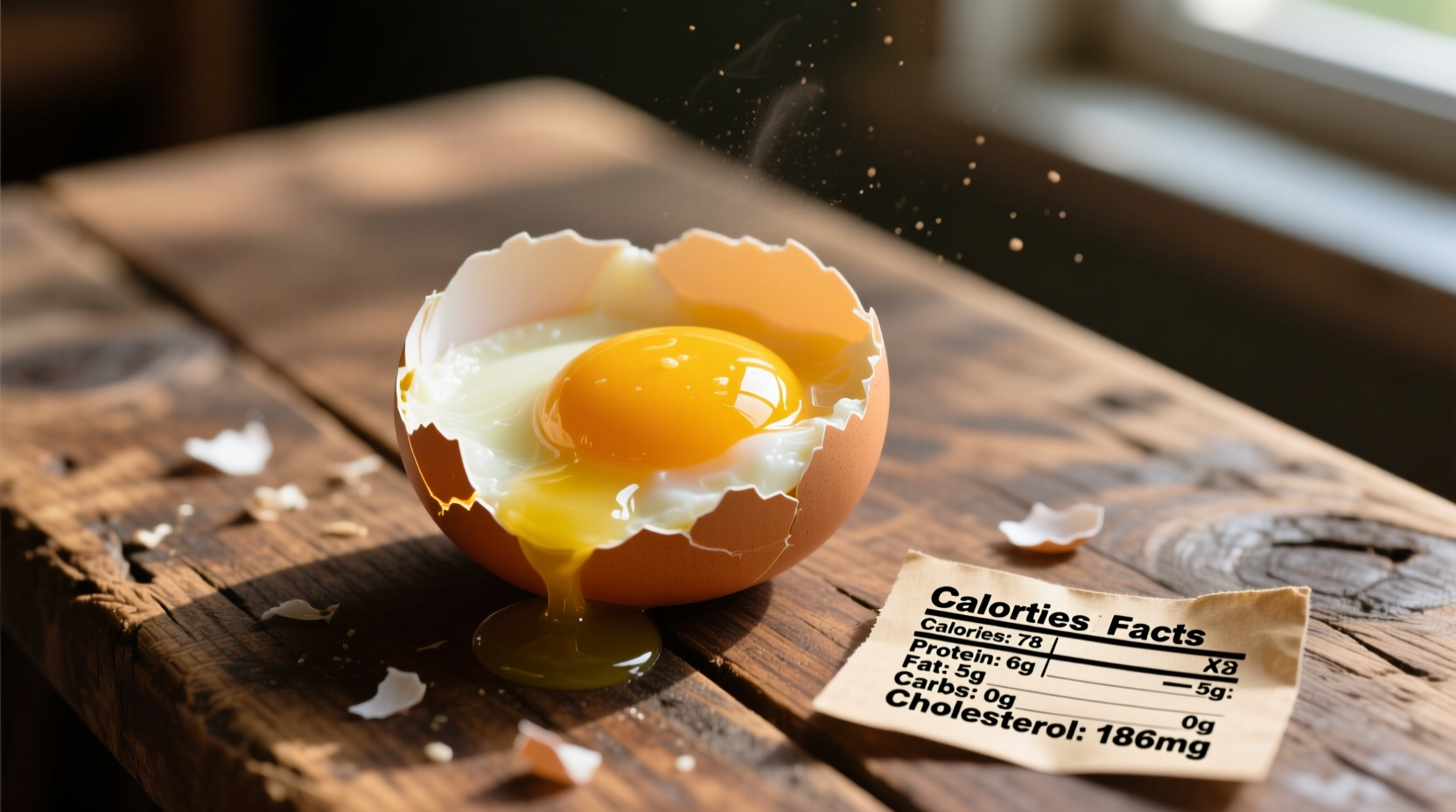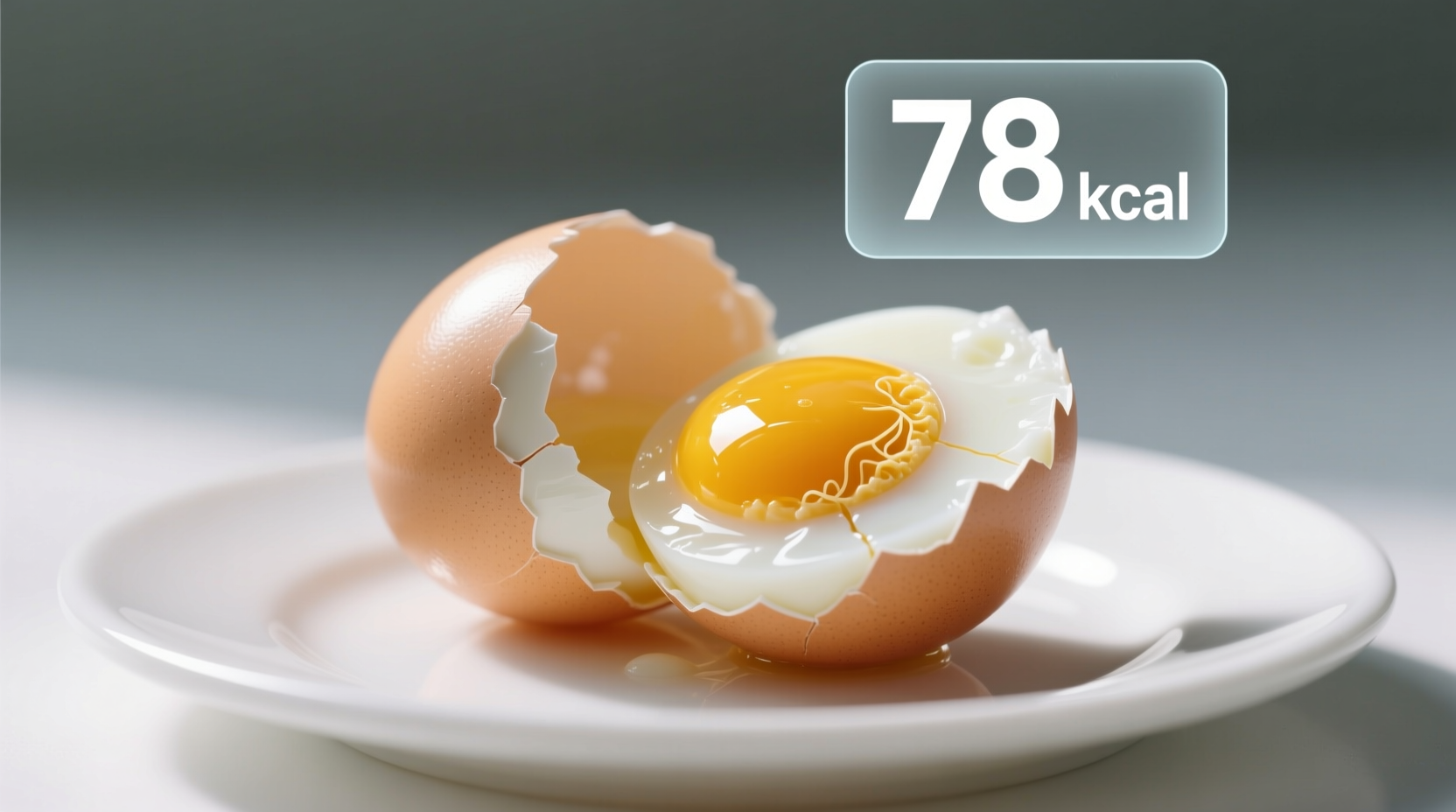Understanding the precise calorie content of cooked eggs is essential for anyone tracking their nutritional intake, whether for weight management, athletic performance, or general health awareness. Eggs remain one of nature's most complete protein sources, but their calorie count changes based on preparation method—a crucial detail many overlook when counting calories.
Why Cooking Method Changes Calorie Content
Eggs themselves contain consistent calories in their raw state, but the cooking process introduces variables that affect the final count. The primary factor isn't the egg itself changing, but rather what's added during preparation. When you cook eggs using fats like butter or oil, those additional calories get incorporated into the final dish.
According to the USDA FoodData Central, the nutritional database maintained by the United States Department of Agriculture, the base calorie content comes from the egg's natural composition: protein, fat, and minimal carbohydrates. The cooking method determines whether additional calories from fats get absorbed.
Calorie Comparison Across Cooking Methods
The table below shows how different preparation techniques affect the calorie count of a single large egg (approximately 50 grams of egg content):
| Cooking Method | Calories per Large Egg | Additional Fat Added |
|---|---|---|
| Boiled or Poached | 78 | None |
| Scrambled (without milk) | 91 | 1 tsp butter (35 cal) |
| Fried | 90 | 1 tsp oil (40 cal) |
| Omelet (with vegetables) | 95 | 1 tsp oil (40 cal) |
| Baked (shirred) | 78 | None |

Factors That Influence Egg Calorie Counts
Several variables affect the final calorie count beyond just cooking method:
Egg Size Matters
The standard nutritional information references a "large" egg (about 50g of egg content), but egg sizes vary significantly:
- Small (38g): 54 calories
- Medium (44g): 63 calories
- Large (50g): 78 calories
- Extra Large (56g): 90 calories
- Jumbo (63g): 100 calories
Added Ingredients
When preparing eggs, common additions dramatically increase calorie content:
- Cheese (1 tbsp shredded cheddar): +25 calories
- Milk (1 tbsp): +5 calories
- Butter (1 tsp): +35 calories
- Cooking spray (1 second spray): +5 calories
Nutritional Value Beyond Calories
While calorie counting matters, eggs offer exceptional nutritional density that makes them valuable beyond simple calorie math. A single large cooked egg provides:
- 6.3 grams of complete protein containing all essential amino acids
- 5.3 grams of healthy fats, including omega-3s in pasture-raised eggs
- Essential vitamins: A, B5, B12, B2, and selenium
- Choline, crucial for brain health (about 147mg per egg)
According to the American Heart Association, dietary cholesterol from eggs has less impact on blood cholesterol than previously thought for most people. Current guidelines suggest that healthy adults can consume one whole egg daily as part of a balanced diet.
Practical Meal Planning Applications
Understanding egg calories helps optimize meal planning for various dietary goals:
For Weight Management
Boiled or poached eggs provide maximum protein with minimal calories, making them ideal for satiety without excess calories. Two boiled eggs (156 calories) with vegetables creates a satisfying 250-300 calorie meal.
For Athletic Performance
Athletes seeking protein might combine three egg whites (51 calories) with one yolk (55 calories) for 106 calories and 14g protein—a lean protein option that supports muscle recovery.
For Keto Dieters
Fried or scrambled eggs with added healthy fats align well with ketogenic principles. One fried egg (90 calories) with avocado creates a nutrient-dense, high-fat meal that fits keto macros.
Common Misconceptions About Egg Calories
Many people misunderstand how egg preparation affects nutritional content:
- Myth: Cooking destroys calories in eggs
Reality: Cooking doesn't reduce calories—it may add them through absorbed fats - Myth: Egg whites have no calories
Reality: Egg whites contain about 17 calories per large egg white - Myth: Organic eggs have fewer calories
Reality: Organic status affects farming practices, not calorie content
Tracking Egg Calories Accurately
For precise calorie tracking:
- Weigh eggs before cooking to determine exact size
- Measure added fats precisely (use measuring spoons)
- Account for all ingredients, including milk or cheese
- Use digital food scales for cooked dishes with multiple eggs
Food tracking apps often underestimate added fats in egg preparation. Research published in the Journal of the Academy of Nutrition and Dietetics shows people typically underestimate added fats by 30-50% when estimating visually.
Conclusion
Knowing the exact calorie content of cooked eggs—78 calories for boiled/poached, 90 for fried—provides essential information for accurate nutritional tracking. The cooking method significantly impacts the final calorie count through added fats, while egg size determines the base calorie content. Beyond calories, eggs offer exceptional nutritional value that makes them a valuable component of most dietary patterns when prepared mindfully.
How many calories are in two fried eggs?
Two large fried eggs contain approximately 180 calories. This accounts for the base 78 calories per egg plus approximately 12 calories absorbed from cooking oil per egg. If you use butter instead of oil, the count would be slightly higher at about 190 calories for two eggs.
Do boiled eggs have fewer calories than scrambled eggs?
Yes, boiled eggs typically have about 13-15 fewer calories than scrambled eggs. A boiled egg contains 78 calories while a typical scrambled egg has about 91 calories. The difference comes from the small amount of butter or oil (about 1 teaspoon) usually added when scrambling eggs, which contributes approximately 35 additional calories that get partially absorbed.
Does the cooking time affect egg calorie content?
No, cooking time alone doesn't change the calorie content of eggs. The primary factor affecting calories is whether additional fats are used during cooking. Whether you cook an egg for 3 minutes or 10 minutes without added fat, the calorie count remains approximately 78 calories for a large egg. The water content may decrease slightly with longer cooking, concentrating nutrients but not significantly changing total calories.
Are egg calories affected by the chicken's diet?
The chicken's diet affects the nutritional profile but has minimal impact on total calories. Pasture-raised or omega-3 enriched eggs may contain slightly different fat compositions (more omega-3s, less saturated fat), but the total calorie count remains virtually identical to conventionally raised eggs of the same size. The USDA confirms that dietary variations in chickens don't significantly alter the caloric content of their eggs.











 浙公网安备
33010002000092号
浙公网安备
33010002000092号 浙B2-20120091-4
浙B2-20120091-4